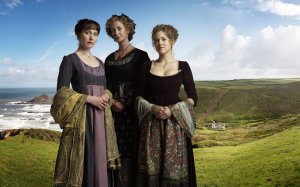Another Austen update. Really.
 You've had enough of the Austen continuations, updates, mashups (zombies! sea monsters!). You don't want Jane to be a detective, or Elizabeth Bennett to take up solving mysteries. You don't need Colin Firth diluting his Regency splendor by playing Mark Darcy to Bridget Jones. I get it. I even find myself wondering if the BBC might forgo another round of film adaptations every decade or so (though I always get sucked in when they do -- see addendum below).
So when I read some good reviews of Sense & Sensibility by Joanna Trollope, I sighed. Do we really need yet another telling of an Austen story, set in contemporary times? But the book was just sitting there on the library's new book shelf and I had a whole lunch hour. So I picked it up.
You've had enough of the Austen continuations, updates, mashups (zombies! sea monsters!). You don't want Jane to be a detective, or Elizabeth Bennett to take up solving mysteries. You don't need Colin Firth diluting his Regency splendor by playing Mark Darcy to Bridget Jones. I get it. I even find myself wondering if the BBC might forgo another round of film adaptations every decade or so (though I always get sucked in when they do -- see addendum below).
So when I read some good reviews of Sense & Sensibility by Joanna Trollope, I sighed. Do we really need yet another telling of an Austen story, set in contemporary times? But the book was just sitting there on the library's new book shelf and I had a whole lunch hour. So I picked it up.
Damned if the thing didn't charm me, through and through -- both for the satisfying re-telling of the Dashwood sisters' triumph over mean relations and caddish men, and for the added pleasure of seeing how Trollope worked modern social mores and silliness into the story. She had to do some minor contortions to account for the women's sudden loss of fortune and social standing (in this version the girls' mother is not a second wife but a woman who ran away with the elder Mr. Dashwood, who left his wife and son behind).
Evil sister-in-law Fanny and her nasty mother, Mrs. Ferrars, are quite as obnoxious, if in more modern ways. And the dashing Willoughby -- or Wills, as he's called here -- tries to give Marianne a sports car, not a horse. But generally the characters go through their paces in approximately the same ways. The servant class is represented in minor but telling cameos by a series of Eastern European nannies.
It's a quick read, but fun. Highly recommended. I even hope someone does a film adaptation of it -- which would make a fine counterpart to the most recent BBC version from 2008 which is quickly rising in my personal ranks of Austen adaptations (this is the addendum mentioned above). I love Ang Lee and Emma Thompson and all that but let's face it, she was way too old to play Elinor and Hugh Grant just too stammery to earn her love. Every single person in the more recent version is perfect in their parts. And it's a perfect length, too, a three-parter so you don't have to give up an entire day like the six-hour Pride and Prejudice, but it still has room for the plot to breathe.
